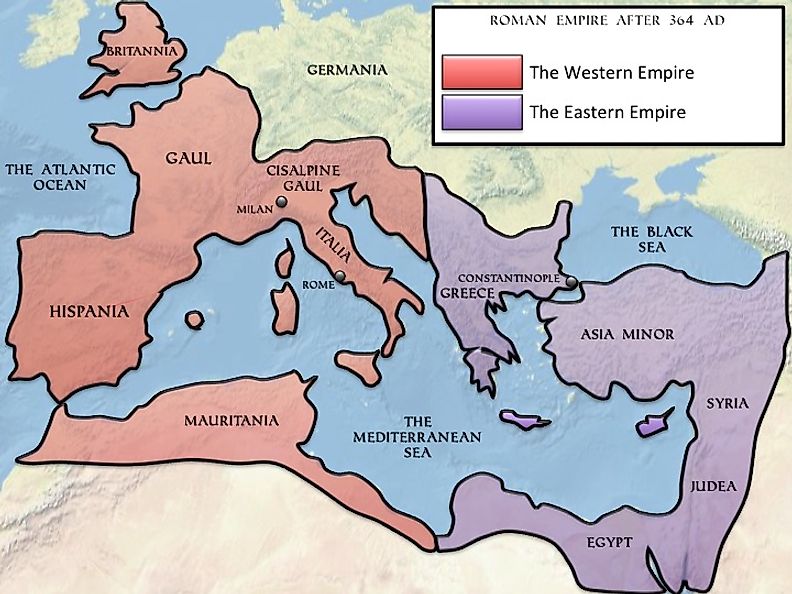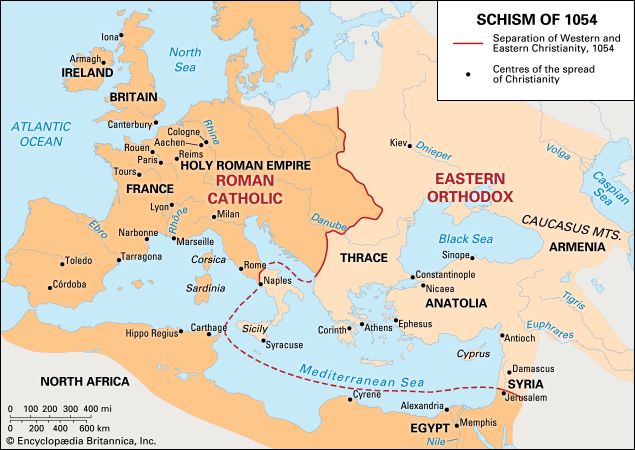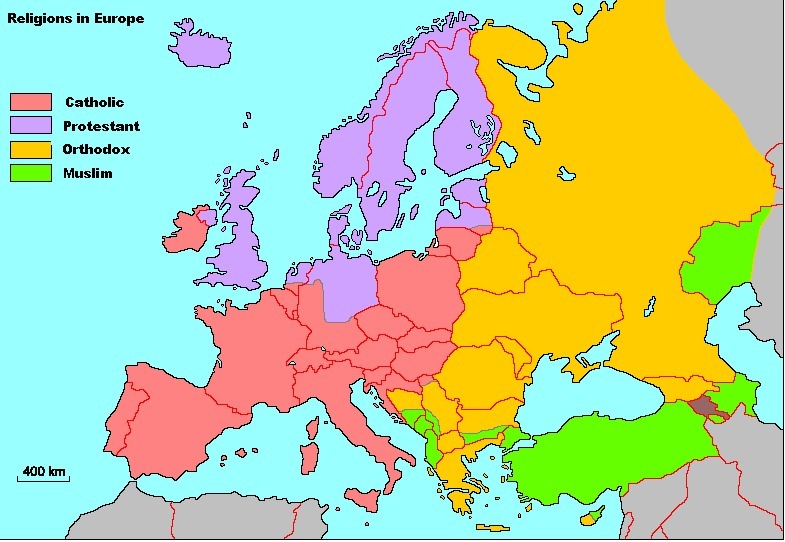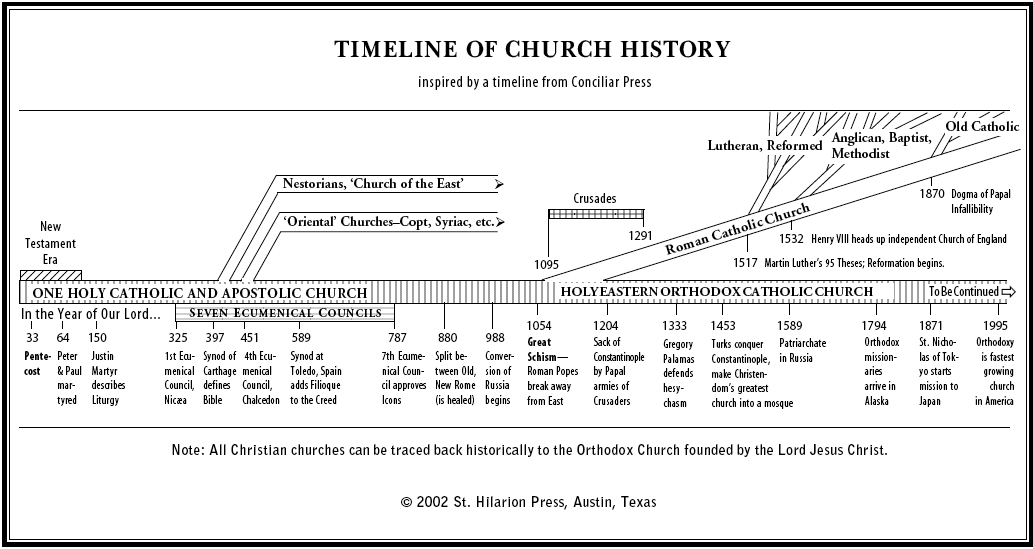Schisms¶
A schism is a split in a religious body. And in order to best understand modern Christianity it can be instructive to first understand the historic schisms.
Brief History¶
There were many schisms in early Christianity, usually from heretical movements that broke away from the church. These heresies were often the impetus for ecumenical councils, which led to deeper articulations of the faith.
early schisms
- Montanism, condemned in AD 177, and died out after a few centuries
- Arianism, resolved in the First Council of Nicea in AD 325
- Donatism, resolved in the Conference of Carthage in AD 411
- Pelagianism, resolved in the Council of Carthage in AD 418
- Nestorianism, resolved in the Council of Chalcedon in AD 451
However, in AD 1054 the great schism split East and West Christendom. At that point, Christianity had remained a relatively unified worldview for over a thousand years. Perhaps unsurprisingly, the great schism fell roughly along the boundaries of the historic Eastern and Western Roman Empire.
East and West¶
As Christianity spread into the world, the Roman empire had been divided between East and West (first by Diocletian), and later the empire was temporarily reunited by Constantine who converted to Christianity and moved the capital away from old Rome and into Byzantium which would later be renamed Constantinople.
Western Rome fell in AD 476, while Eastern Rome, also known as the Byzantine Empire, would continue the Roman empire (now as a Christian empire) for over a thousand more years (the longest living empire in the history of the world).

The Great Schism¶
In AD 962, Frankish and Germanic remnants of the long dead Western Roman Empire established the Holy Roman Empire, and through political ambitions insisted on papal supremacy over all of Christendom. By AD 1054 the east and west officially excommunicated each other (first Rome excommunicated the patriarch of Constantinople, then all four eastern patriarchs excommunicated Rome).

Reformation Schisms¶
Later, in the 16th century the protestant reformation started a process of continuous schisms within the decaying Holy Roman Empire. Despite specific theological objections, the protestant reformation was mostly along ethnic lines, succeeding in northern Europe (England, Germany, Netherlands, etc) with a notable exception of Ireland which stayed Catholic. This left the Roman Catholic Church dominant in southern Europe, notably within the boundaries of the romance languages (Italy, France, Spain, Portugal).

Along these schismatic lines, Roman Catholicism spread into Central and South America (colonies from Spain and Portugal), whereas Protestantism spread into North America (immigrants from northern Europe). In fact many of the early settlers into the north-American colonies were escaping religious persecution (such as the various anabaptist sects).
This splintering of protestantism never ceased and continues now into our modern age. There are now tens of thousands of different "Christian" sects. In fact, a modern protestant is likely to experience a schism even at their own local church, which are usually anchored only by a popular pastor. It's important to understand that this splintering is a continuation of the great schism of AD 1054 and feeds into the continuous destructive revolutions of our modern worldview.
Timeline of Major Schisms

Christ's Church¶
In the midst of these continuous schisms, when someone says they are a Christian, what does that even mean?
As atheists are want to point out, it is as if the so-called "Christians" are arbitrarily picking and choosing passages from scriptures that adhere to their modern secular worldview. In other words, is it Christ or antichrist that we are following?
One holy catholic and apostolic church has ostensibly become many: protestant, Roman Catholic, and Orthodox churches.
How does one find Truth in this chaos? How does one find the one holy catholic and apostolic church?
Matthew 16:18
And I also say to you that you are Peter, and on this rock I will build My church, and the gates of Hades shall not prevail against it.
Protestantism¶
It can be said that most Christians agree completely on the major issues of Christianity but are only in schism over some theological or ecclesiological disagreements. This is the Mere Christianity approach (by C.S. Lewis) and it is popular amongst mainline protestants. However, if we choose whichever protestant church we "feel" is right, then are we not giving in to self-worship and nihilism? Truth is not found by our judgment, but in Christ.
John 6:68
Then Simon Peter answered him, Lord, to whom shall we go? thou hast the words of eternal life.
If we are honest, we cannot consider any protestant church as being the one holy catholic and apostolic church, to do otherwise or claim an "invisible church" puts ourselves as judge over Christ and His words.
And perhaps the most troubling aspect of modern protestantism is the continued schisms. In a protestant worldview, my own personal interpretation of scripture is as valid as any. This is encouraged within a secular worldview, and this is to turn our back on Christ Himself.
And even if you were to find a pious protestant church, how long till that church falls into blatant heresy? How many churches today have founders that would war against their modern members? Remember that the reformers would put to death anabaptists, and yet today "believers baptism" has become the norm in many reformed churches.
We must seek the one holy catholic and apostolic church, and it is necessarily as visible as Christ Jesus -- the God-man was visible to His disciples, to the Pharisees, to the Romans, to the Canaanite woman, to everyone.
Catholicism¶
The word catholic simply means universal, and note that the creed refers to one holy catholic and apostolic church.
Roman Catholicism refers specifically to the presumed universal authority of the former Holy Roman Empire which arose in AD 962, but wasn't referred to as such till centuries after the great schism in AD 1054, and also became known as the Holy Roman Empire of the Germanic Nation.
Prior to this, there was no presumption of a supreme worldly Christian authority. The church was unified under Christ, guided by the Holy Spirit, not by a worldly empire, and certainly not by an empire that wouldn't arise till nearly a thousand years after Christ.
Despite the name, the Holy Roman Empire was not the continuation of the old Roman Empire, nor even the Western Roman Empire which had fallen in AD 476. The Eastern Roman Empire, the Byzantine Empire, survived till AD 1453 (making it the longest living empire in the known history of the world). The historic grounds for Roman Catholicism as the one holy catholic and apostolic church is tenuous at best.
Voltaire
This agglomeration which was called and which still calls itself the Holy Roman Empire was neither holy, nor Roman, nor an empire.
This was not always the case, prior to the great schism there was one holy catholic and apostolic church in both the East and the West. There is a thousand years of historical evidence, ecumenical councils, church fathers, and even pagan Roman history attesting to the persecution of these unified Christians.
In fact, immediately after the great schism, most all Christians had no idea there even was a schism. Even afterwards, entire generations had no idea. And those that did know assumed it would be resolved as prior schisms always were. When you're focused on Christ, the specifics of a temporary schism motivated by worldly empires is not actually all that important.
Because of this, we must concede that despite questionable historicity, modern Catholicism has a strong claim to be the original church. In fact, necessarily both east and west were Christ's church in the first thousand years. Other than getting muddier over time, did east or west at some point cease being His church?
Like in the parable of the prodigal son, there were two sons, the younger left to waste his inheritance. He was still his father's son even while he was lost (in schism from the Father). And importantly, the older son who did not leave, he was rebuked for questioning his father after the prodigal son returned. Ultimately, both sons were in error.
Likewise, one or both sides of the great schism is necessarily in error. This is true of any schism. The only question; which side of the schism is the prodigal son, and which is the older brother? Or is it a little bit of both?
While earlier schisms often resulted in a failed sect, like the many gnostic or Arian sects, Eastern and Western Christianity have both survived over a thousand years while in schism. They are both the remnants of long-lived empires, and both of those worldly empires have fallen. The gates of hell have not prevailed. It is perhaps wise to look at east and west as if they are both in error, and follow Christ obediently towards salvation.
Importantly, we as Christians cannot judge His church; Truth is not decided by our judgement, but on His revelation and His judgment. If "you" decide to be Catholic or Orthodox or even protestant, you're choosing nihilism and not Christ.
"You" do not determine truth.
"You" can only rationalize beliefs.
And your beliefs are irrelevant to Truth, who is the person Christ Jesus.
We ought to discern carefully here, and we should proceed cautiously. Our goal is to follow Christ and not antichrist.
If we can understand that both eastern and western Christendom were the one holy catholic and apostolic church, then we must ask: Are there heretical innovations that must be resolved in order to begin discussing unification between east and west?
The Catholic answer, is maybe, and we have an instructive case of Eastern Catholics.
The Orthodox answer, is yes, absolutely there are many heretical innovations from Rome that must be resolved in order to unify, such as:
- filioque -- why was it added? What specific heresy is this guarding against? And why did the east not fall into that heresy without the filioque? Why was it added the way it was added?
- papal supremacy and infallibility -- it did not exist for most of church history. Was everyone in the early church wrong? What about the innovations of Vatican I, and Vatican II?
From a Roman Catholic perspective, what would need to change about the Orthodox churches for them to unify? We can look at Eastern Catholics to get an idea. Not much changes, but they must grant authority to the pope. Unification according to Roman Catholicism is thus not about Christ, but about the authority of the pope.
Catholics claim that papal supremacy is from Peter. Would the apostle Peter agree with the Roman Catholic claim of supremacy and the infallibility of the pope's teaching as head of the church? Did not Paul once rebuke Peter on his official teaching? Did not Christ himself rebuke Peter many times?
Galatians 2:14
But when I saw that they walked not uprightly according to the truth of the gospel, I said unto Peter before them all, If thou, being a Jew, livest after the manner of Gentiles, and not as do the Jews, why compellest thou the Gentiles to live as do the Jews?
And, most fascinating and perhaps with great prescience, the greatest rebuke to Peter came immediately after Christ promised that Peter is the rock upon which Christ will build His church.
Matthew 16:18-24
And I also say to you that you are Peter, and on this rock I will build My church, and the gates of Hades shall not prevail against it. And I will give you the keys of the kingdom of heaven, and whatever you bind on earth will be bound in heaven, and whatever you loose on earth will be loosed in heaven. Then He commanded His disciples that they should tell no one that He was Jesus the Christ.
From that time Jesus began to show to His disciples that He must go to Jerusalem, and suffer many things from the elders and chief priests and scribes, and be killed, and be raised the third day. Then Peter took Him aside and began to rebuke Him, saying, "Far be it from You, Lord; this shall not happen to You!"
But He turned and said to Peter, "Get behind Me, Satan! You are an offense to Me, for you are not mindful of the things of God, but the things of men." Then Jesus said to His disciples, “If anyone desires to come after Me, let him deny himself, and take up his cross, and follow Me."
No man except the God-man is infallible. But even if we grant the claim of papal infallibility (when the Roman Pontiff speaks ex cathedra), why would that come in AD 1870? Why is the successor to Peter only infallible in modern times and only in Rome?
Peter also founded the church in Antioch, which is an Orthodox Church. Is Peter's successor in Antioch also infallible? If infallibility was due to the importance of Rome then wouldn't infallibility have been granted to Constantinople? Old Rome had fallen during that first thousand years of the one holy catholic and apostolic church. Importantly, these are the concerns of men -- the very reason Christ rebuked Peter.
Very obviously there was no infallible "vicar of Christ" in the one holy catholic and apostolic church (otherwise there would have been no need for ecumenical councils), and it is very clear that these are innovations and deviations from tradition. And yet, like the prodigal son, this is still Christ's church, even if that church is wasting its inheritance while in schism.
Orthodoxy¶
When Orthodox churches fall out of communion with each other, it is not hidden nor quietly resolved by a "vicar of Christ". Unification requires the two sides settle their difference as guided by the Holy Spirit. Traditionally, this was done at ecumenical councils, but there has not been such a council in over a thousand years.
The councils were started by Constantine himself, in the Eastern Roman Empire. These councils resulted in a deeper articulation of Christian faith. The schisms were ultimately a good and necessary feature of the church, the means to make public all differences that must be resolved before communion.
However, after the great schism, while the west innovated, the east stagnated (at least by our modern secular worldview). For better or worse, the Eastern Orthodox Church has not changed much of anything since those days of one holy catholic and apostolic church.
The goal of Orthodoxy is not vain unity, nor any kind of unity. The goal of Orthodoxy is Christ. Ultimately, Christ is the spirit of Truth, and He does not hide in darkness nor deceit. If the Catholics are right, then they have to claim that the east "fell" and is in heresy -- but what did the east do? What about them is heretical? Is it that they became "stuck" in the past? Can that even be a heresy?
Why was there not a protestant reformation in the east? Protestantism and its continuous disintegration into different sects certainly seems to be the fruits of the scholastic innovations in Roman Catholicism, fruits that were not seen in Eastern Orthodoxy.
Lastly, if the goal is to commune with Christ, to come closer to Christ through His church, then why innovate? Would not the apostolic tradition be paramount above all else? Why change?
And if there was necessary change, is that not a tacit admission that everyone who came before, every saint (even western saints) within the one holy catholic and apostolic church was wrong or naive? And wouldn't this necessarily include Peter?
Most important, what heresy is being done by Eastern Orthodoxy? How are they wrong today yet were right in the first thousand years of church history?
All things considered, it looks an awful lot like Rome is in heresy, in schism from Christ's Church, and Eastern Orthodoxy is waiting patiently, "stuck" in the past as it were, waiting and waiting and waiting for the prodigal son of Rome and its protestant offspring to return to the Father.
At worst, Orthodox Churches are a bit like the older son to the prodigal son, and as such many will receive the Father's rebuke on that day the prodigal son returns.
As Christians we ought to follow Christ, who taught us the story of the prodigal son, and we ought to identify ourselves and our church with the prodigal son and also with the older brother. We ought to return home, and furthermore we ought to be grateful and celebrate when the prodigal son returns home to the Father.
Luke 15:11-24
And he said, A certain man had two sons: And the younger of them said to his father, Father, give me the portion of goods that falleth to me. And he divided unto them his living. And not many days after the younger son gathered all together, and took his journey into a far country, and there wasted his substance with riotous living. And when he had spent all, there arose a mighty famine in that land; and he began to be in want. And he went and joined himself to a citizen of that country; and he sent him into his fields to feed swine. And he would fain have filled his belly with the husks that the swine did eat: and no man gave unto him. And when he came to himself, he said, How many hired servants of my father's have bread enough and to spare, and I perish with hunger! I will arise and go to my father, and will say unto him, Father, I have sinned against heaven, and before thee, And am no more worthy to be called thy son: make me as one of thy hired servants.
And he arose, and came to his father.
But when he was yet a great way off, his father saw him, and had compassion, and ran, and fell on his neck, and kissed him. And the son said unto him, Father, I have sinned against heaven, and in thy sight, and am no more worthy to be called thy son. But the father said to his servants, Bring forth the best robe, and put it on him; and put a ring on his hand, and shoes on his feet: And bring hither the fatted calf, and kill it; and let us eat, and be merry: For this my son was dead, and is alive again; he was lost, and is found. And they began to be merry.
Now his elder son was in the field: and as he came and drew nigh to the house, he heard musick and dancing. And he called one of the servants, and asked what these things meant. And he said unto him, Thy brother is come; and thy father hath killed the fatted calf, because he hath received him safe and sound. And he was angry, and would not go in: therefore came his father out, and intreated him. And he answering said to his father, Lo, these many years do I serve thee, neither transgressed I at any time thy commandment: and yet thou never gavest me a kid, that I might make merry with my friends: But as soon as this thy son was come, which hath devoured thy living with harlots, thou hast killed for him the fatted calf.
And he said unto him, Son, thou art ever with me, and all that I have is thine. It was meet that we should make merry, and be glad: for this thy brother was dead, and is alive again; and was lost, and is found.